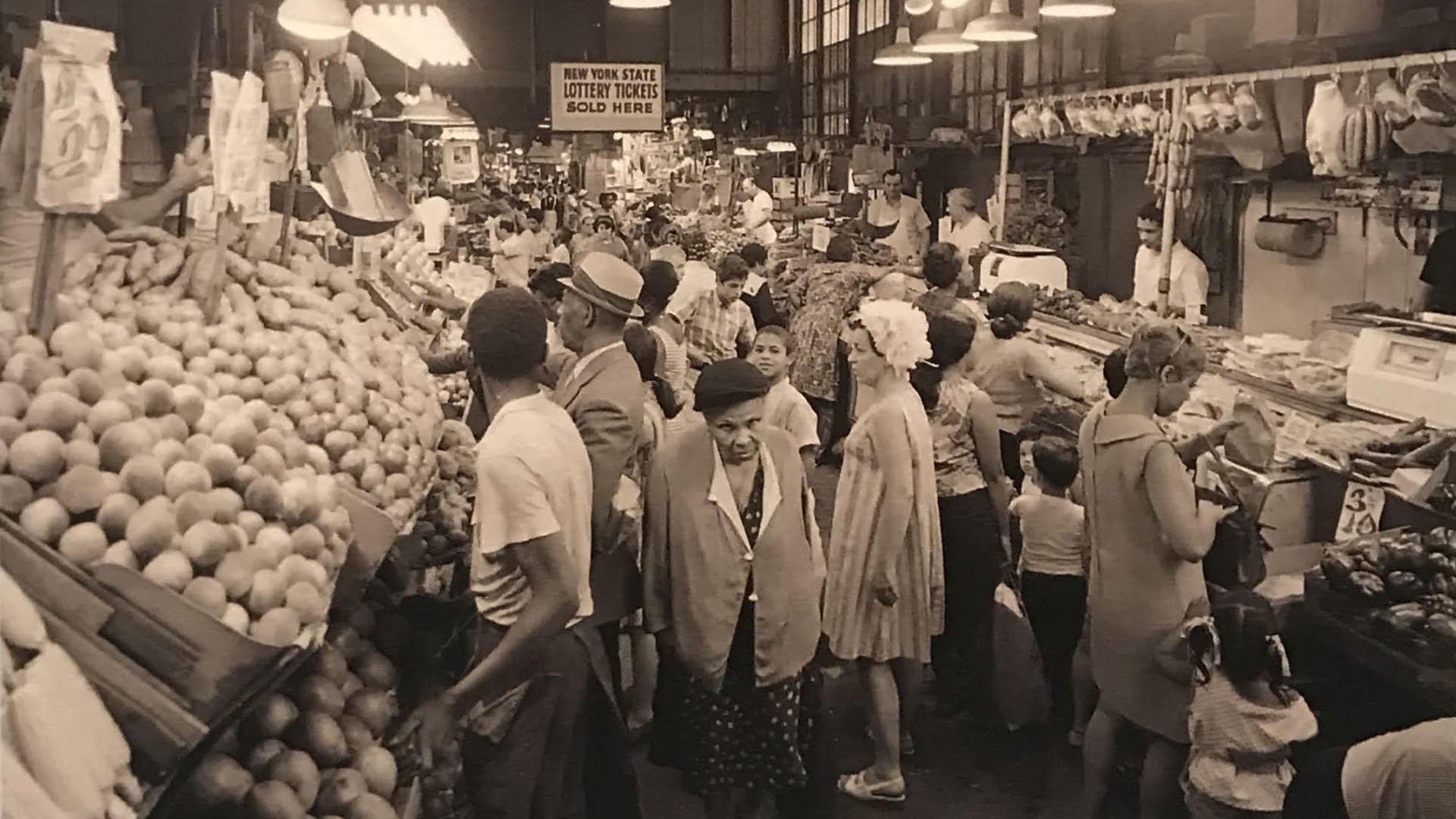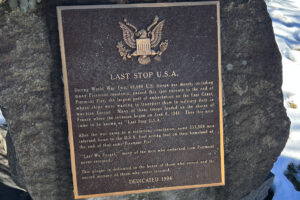I am going to be 75 soon, but I remember many things about the Barrio culture of my early childhood. I remember what I experienced at La Marqueta one day. It comes back to me as if I were experiencing it today. That day—its colors, its smells, its rhythm, its nuances, its voices are so indelible, rich, and ever so New York Puerto Rican.
We are walking through Spanish Harlem from our apartment at 103rd Street and Third Avenue. I’m with Mami and Willy, my younger brother. It’s a spring day in May, and although there is a slight cool breeze, the sweater I am wearing is making me feel warm.
“Mami, may I take my sweater off, please?”
“No, Junior! A block away, you heard me tell you that I want you to keep that sweater on! Now let’s keep walking!
Suddenly, I think I know where we are going. “Are you taking us to La Marqueta, Mami? I don’t want to go there!”
“So at age five, you think you’re a big man and that I will let you govern yourself? Hmm?”
“No, no, Mami…um, it’s that I am getting a stomach ache, Mami! PleaseI”
“Junior stop whimpering. You are being impudent. Quiet! We are in public.”
Willy says, “ I don’t know why Junior doesn’t like La Marqueta. I hope we will buy some fish! I like the funny eyes of the dead fish on ice. Mami, can we go see the hens and chicks? Mami, can we?”
“Sí, mi amor. Papi wants us to buy a hen for his soup, too. You’re a good four year-old
boy, Willy. Thank you for cooperating.”
We arrive at the first building of La Marqueta, where my mother wants to buy fruits and vegetables. Just as we are about to enter, a train rumbles high above our heads on the tracks. Its noise rattles and shakes my insides and makes my bony knees knock together. It is scary, but fun too. Inside, I pinch my nose to make sure Mami sees that I hate being here. The smell of rotting fruits and vegetables is awful. I can’t even smell the sweetness of the nice pineapples that I point to so Mami will know I want her to buy one just for me. But Mami says, “I am not buying pineapples today.”
Everywhere stalls are piled with tall hills of fruits and vegetables. Some barrels are full of what Mami calls grains. The grains and beans are like the colors in a big box of crayons. We keep walking and I ask why there are puddles indoors on the cement floor. Mami doesn’t want us to step on these sloppy puddles that are left on the floor after it is hosed to wash away filthy waste. But I stay behind a little to get a chance to stomp on a tiny puddle, and then quickly run to hold her hand.
I am looking at everyone. I like trying to understand what I hear grown ups say in English, which I am really getting good at speaking, even if we only speak Spanish at home. Mami is learning English, too. But most people in La Marqueta are speaking Spanish. Mami says I should not stare at people. But I do and soon I am frightened because I cannot see Mami. But then I see her up ahead holding Willy’s hand and looking around for me, so I zig-zag around strangers to join them. I almost cry when she scolds me, “Do you want to get lost? If you keep stopping to investigate everything, you will get lost!”
I still want to go home. But Mami wants to talk to a vendor she calls ”El Italiano” to see if he has good prices today. Mami puts on her prettiest smile as she greets the old man, who is very glad to see her. Then she asks him in English, “ I am good customer to you, no? How much of discount you give to me if I make big purchase today?” The old man grins and makes his offer, but Mami wants a bigger discount, plus, she thinks for her big order he should throw in two free mangoes.
“El Italiano” booms out a laugh, “Ay, ay, ay, mia donna bella! Va bene! Sí, muy bien, señora! Ok, good! I sell for you all for lower dinero. You know me. You trust me, an old amigo!” His offer sounds good to Mami, so she winks at us to let us know she won this easy battle.
Before she gives her final yes, she tells “El Italiano” that she must first pick the two mangoes. She comes back with two of the largest ones. She tells him to keep them by his register because no one but he can take them from there. The man says aloud, “She is very smart woman, no, boys?” Then he raises his hairy eyebrows, and winks at Willy and me.
Mami takes too long choosing other things she wants to buy, so I let out my tantrum, “Let’s go home! It really smells bad in here!”
Mami pretends not to be embarrassed by my rude outburst in public. To prove she is a good mother, she says “Sorry, señor.” Then she begins talking to me loud enough for “El Italiano” and other customers to hear her. With her hand on my shoulder, she says, “Junior, mi hijito, I know you love the smell of mangoes like the ones I am getting for you free, thanks to this nice man. Well, could you please let me enjoy taking my time to smell and choose the freshest cilantro, the most beautiful garlic, the nicest big onions, and these nice overripe plantains? Fruits and vegetables do smell good!” After paying for her produce, we walk away far enough for Mami to give me her raised eyebrows and big eyes look. Willy laughs, and I know what might await me.
At the door to the poultry building, I am pulling on Mami’s hand. People are annoyed because we are blocking the door. “See! See, how you make people look at us? Can’t you behave like Willy?” I decide to obey and enter, but pull my sweater up to my nose to hide the stink of birds, feathers, and droppings. I am stunned as I pass by yellow-skinned ducks that must have goosebumps because they are being stretched over ice. High up, squawking pigeons are walking circles and bobbing their heads like they are nervous in their cage. When they flap their wings, it’s funny to see how their feathers land in Willy’s hair.
Parrots repeat, “Wanna buy me? Take me home! Hey you, bird lover, what’s your name?”
I am having fun imitating the parrots’ voices and their shoulder shrugs, when I hear Willy say, “Junior, Mami wants us to go find a hen, right now!”
Don Pedro, the poultry man, also seems to know Mami. He promises to sell her the best hen he has today. Mami reminds him that she has particular ways she needs her hen butchered. “Sí, señora, I know, I know. To your order, yes!”
Mami makes Willy our guide through a maze of stacked wooden cages. I have to hold my sweater constantly over my nose. I want Willy to stop loving the snowy white hens so much; to stop feeling so sorry for the ugly, sad grey ones; and to stop singing “peek-peek” to get the black hens to peek out from the dark shadows of their cage. Then finally, he finds the one he really loves—it’s one with bright, shiny red and brown feathers. I think the hen is nice, but I do not want to taste her in Mami’s soup. Don Pedro cheers, “Muy bien, muchacho! Señora, he found my very best hen today. What a lucky boy you have!”
The old man shoves his arm into the cage to frighten the bird into a corner of its cage. Once he grabs her feet, she flutters, struggles, and clucks for her life and freedom. Don Pedro pulls out a chord from his pocket, and the bird’s leg are tied before I can believe it. Then the man gives the bird’s upper neck a slight slit and hangs it upside down so its blood will drain into the its neck. At home, Mami will put the blood-filled neck into her soup, and Papi will be very pleased. The hen keeps twitching. It takes a long time, and I get tired of waiting for the bird to calm down. But finally, Don Pedro says, she is dead. He takes the stiff bird down and slices off its head. Next I see him throw it into a revolving drum and pull it out featherless. As he grabs a cleaver, he pauses to wink at us, and pretends to be judging where to attack the corpse. Whack! He makes an angry face to get a strong grip, and pulls out tangles of bluish, yellow and gray intestines. The odor makes my stomach turn, and I have to cover my nose again. Mami reminds Don Pedro to wrap the neck, the organs, and the embryo yolks so she can use them all to make her soup. I hate Mami’s chicken soup. As she pays, she praises the man, “Perfecto, Don Pedro! Gracias!” Then she asks us to repeat after her, “Gracias! Adios, señor!”
I really panic when I recognize the smell coming from the building across the street that I must enter. I stick my tongue out at Willy when he cheers that he will get his fish. Inside, the voices in this building seem to echo in my ears much louder than in other buildings. I hear many
languages, but mostly it is very loud Spanish I hear. Every breath I take reeks of live or dead fish. I get nervous when Mami says we are walking to the middle of the building where she knows vendors who have the best variety and quality of fish. As I stumble behind Mami, I watch vendors casting unwanted fish parts into far off garbage cans. When their aim misses, I think I see a thousand flies trying land on the mess on the floor, but they are slammed by huge fans onto curtains of fly paper next to the cans. The stink feels like part of me. I whine, “I’m tired, Mami,” and she tells me sit on a bench, where she can watch me. I slump down with a sick tummy, thinking of how I hate fish, when a horrible memory comes into to my head—-
Mami has made a yummy fish…She has taken time
to make sure she has not left any bone in my serving…
I am smiling at Mami…She is happy to see I am enjoying her fried fish…I am eating well, when suddenly
I am choking…I am gasping really hard for breath…
She screams… jumps up and grabs me…
She turns me facedown on her lap…
She pounds my back until a fishbone forces its way
out of my throat.
Abruptly, Willy startles me from behind, and my heart is pounding. He is delighted that Mami has bought the fish he helped Mami choose. He tells me Mami told she will marinade it in oil, vinegar, and garlic to make it really tasty. He snickers and adds, “She says she will fry the head and eyeballs, too!” I know he is teasing me. I hate Willy’s stinky, old fish with fried blank, gray eyes. I hate the stink of La Marqueta. I cannot breathe. I hate that I am here. I shuffle over to Mami to tell her I am gagging. Mami says I am faking. I am angry at her and give her my stink eyes. But her eyes tell me I better behave because I will not get my way.
“But Mami,” I plead, “I might throw up here. Please?”
“Breathe through your mouth! Don’t use your nose to breathe,” she recommends. I
try but I can’t. I am beginning to retch. She notices that I am pale and weak, and softens. She asks permission from customers to crash the line so she can pay for Willy’s fish.
“Let’s go, now!” Mami says, and gives me a handkerchief from her purse for me to cover my nose. It smells like her perfume, like gardenias, but I tell her it’s not helping. I feel worse. She asks a vendor to let us out the exit behind his stall he is only supposed use for deliveries. She keeps urging me to hold on. Outside, a kind passerby who know I am sick shows Mami a nearby puddle just off the curb where I won’t leave a mess on the sidewalk. Mami orders Willy to stand by her shopping bags. She catches me as I begin collapsing. She holds me against her body, bends me at the waist, and supports my forehead. When she tells me not to be afraid because she won’t let me fall. Trusting her, I trust her, I relieve myself into a big puddle that reflects my droopy face. The water is murky, with swirls of greens and purple gasoline that leaked from some car. Now it also swirls with my last meal. Mami wipes my face and cannot stop kissing the top of my head. She removes my sweater because I have messed it.
“Junior, mi amor, I know what might help you feel better,” she says. “But we have to go into another building of La Marqueta. I promise you it will not smell bad there.”
I am too weary to fuss and hold her hand along on the narrow sidewalk between the street and La Marqueta to a farther off building. The sun is shining and the fresh air is warmer. We are barely inside, when Mami guides me to a showcase, where I am entranced.
“Junior, look…cheesecake! Hijo mio, it’s your favorite. Which of the small ones should I buy for you to eat all by yourself at home when your stomach calms down. Which one…the pineapple…or the cherry?”
I point to the pineapple cheesecake, too upset to talk.
Historical Note: “La Marqueta” (Spanglish for “El Mercado”) is a marketplace under the elevated Metro North railway tracks between 111th Street and 116th Street on Park Avenue in East Harlem in Manhattan, New York City. Its official address is 1590 Park Avenue. In its heyday in the 1950s and 1960s, over 500 vendors operated out of La Marqueta. It was an important social and economic venue for Hispanic NewYork. The New York Times called it “the most visible symbol of the neighborhood.” It has since dwindled in size.”
José J. Morales lives in Albany, New York. He is a retiree of the NewYork State Education Department. His interests include singing, painting, and writing. He enjoys writing poetry, memoir stories, and flash fiction, which often include Puerto Rican cultural elements.





